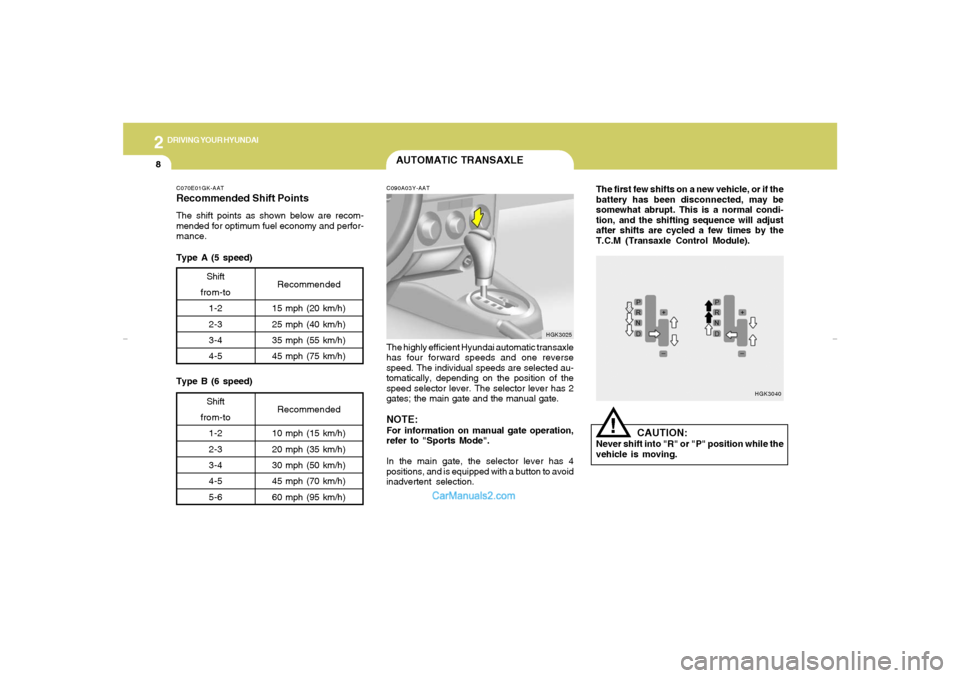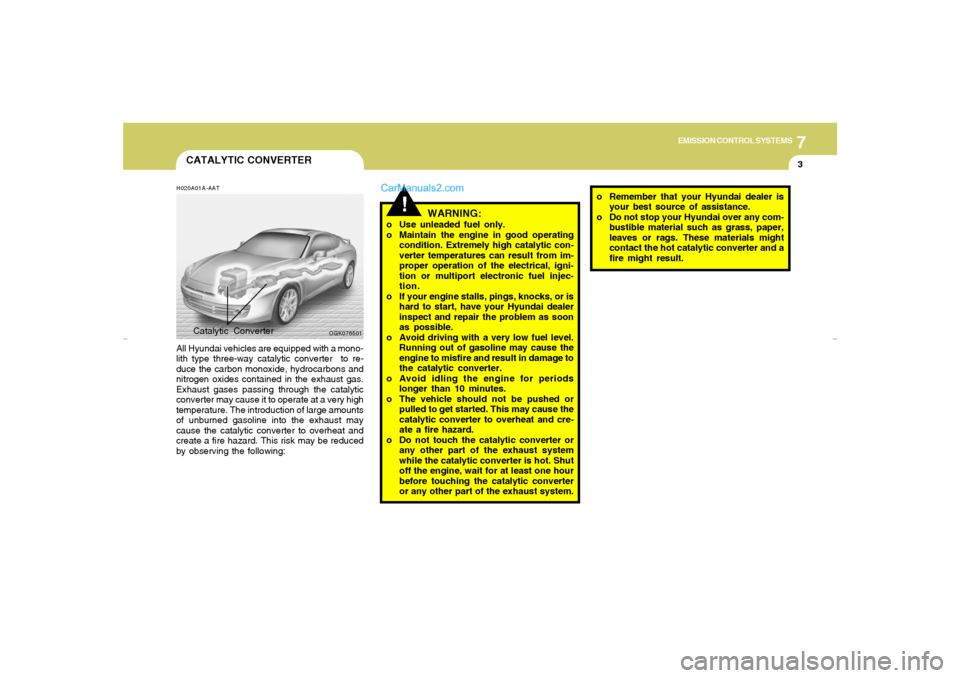2007 Hyundai Tiburon fuel type
[x] Cancel search: fuel typePage 14 of 269

1FEATURES OF YOUR HYUNDAI2
FUEL RECOMMENDATIONS
CAUTION:
Your Hyundai's New Vehicle Limited War-
ranty may not cover damage to the fuel
system and any performance problems that
are caused by the use of fuels containing
methanol or fuels containing MTBE (Methyl
Tertiary Butyl Ether) over 15.0% vol. (Oxy-
gen Content 2.7% weight.)
B010B01A-AATWhat About Gasohol?Gasohol (a mixture of 90% unleaded gasoline
and 10% ethanol or grain alcohol) may be used
in your Hyundai. However, if your engine devel-
ops driveability problems, the use of 100%
unleaded gasoline is recommended. Fuels with
unspecified quantities of alcohol, or alcohols
other than ethanol, should not be used.
B010A02JM-AATUse Unleaded GasolineUnleaded gasoline with a Pump Octane
Rating of 87 (Research Octane Number 91)
or higher must be used in your Hyundai.
B010D01A-AATDo Not Use MethanolFuels containing methanol (wood alcohol) should
not be used in your Hyundai. This type of fuel
can reduce vehicle performance and damage
components of the fuel system.
!
OGK016100N
UNLEADED
FUEL ONLY
B010C01A-AATUse of MTBEHyundai recommends that fuels containing
MTBE (Methyl Tertiary Butyl Ether) over 15.0%
vol. (Oxygen Content 2.7% weight) should not
be used in your Hyundai.
Fuel containing MTBE over 15.0% vol. (Oxygen
Content 2.7% weight) may reduce vehicle per-
formance and produce vapor lock or hard
starting.
!
WARNING:
o Do not "top off" after the nozzle auto-
matically shuts off when refueling.
o Tighten the cap until it clicks, otherwise
the "
" light will illuminate.
o Always check that the fuel cap is in-
stalled securely to prevent fuel spillage
in the event of an accident.
gkflhma-1a.p659/12/2006, 3:14 PM 2
Page 68 of 269

1FEATURES OF YOUR HYUNDAI56
1. Distance to Emptyo This mode provides the estimated distance
to empty from the current fuel level in the fuel
tank.
o The trip computer may not register additional
fuel if less than 1.36 gallons (6 liters) of fuel
are added to the vehicle.
o When the battery has been reinstalled after
being discharged or disconnected, drive
more than 20 miles (32km) for an accurate
distance to empty.
OGK016401N
Type A
Type B
o When the distance to empty is less than 31
miles (50 km), the symbol will always come
on and the distance to empty digits will
indicate "---" with flash until more fuel is
added.NOTE:o The distance to empty can differ from
the actual tripmeter according to driving
conditions.
o The distance to empty can vary accord-
ing to the driving conditions, driving
pattern or vehicle speed.
OGK016402N
Type A
Type B
2. Average Speedo This mode indicates the average speed
travelled since the last average speed reset.
o To reset the average speed to zero, press
and hold the reset switch for more than 1
second while the average speed is being
displayed.
OGK046033N
Type A
Type B
gkflhma-1a.p659/12/2006, 3:16 PM 56
Page 69 of 269

1
FEATURES OF YOUR HYUNDAI
57
MULTI GAUGEB330C02GK-GAT(If installed)The multi gauge consists of a torque gauge,
instantaneous fuel consumption gauge, and
volt meter.
B330C01GK
Torque gaugeIt shows instantaneous change of the torque by
rpm.
Instantaneous fuel Consumption gaugeIt shows instantaneous fuel consumption ac-
cording to driving conditions. The more indi-
cated figure is low, the more it indicates efficient
driving situation.
B330C04GK
3. Drive Timeo This mode indicates the drive time travelled
since the last drive time reset.
o To reset the drive time to zero, press and
hold the reset switch for more than 1 second
while the drive time is being displayed.
OGK016403N
Type A
Type B
gkflhma-1a.p659/12/2006, 3:16 PM 57
Page 148 of 269

2
DRIVING YOUR HYUNDAI
8
The first few shifts on a new vehicle, or if the
battery has been disconnected, may be
somewhat abrupt. This is a normal condi-
tion, and the shifting sequence will adjust
after shifts are cycled a few times by the
T.C.M (Transaxle Control Module).
HGK3040
!
CAUTION:
Never shift into "R" or "P" position while the
vehicle is moving.
C070E01GK-AATRecommended Shift PointsThe shift points as shown below are recom-
mended for optimum fuel economy and perfor-
mance.
Shift
from-to
1-2
2-3
3-4
4-5Recommended
15 mph (20 km/h)
25 mph (40 km/h)
35 mph (55 km/h)
45 mph (75 km/h)Shift
from-to
1-2
2-3
3-4
4-5
5-6Recommended
10 mph (15 km/h)
20 mph (35 km/h)
30 mph (50 km/h)
45 mph (70 km/h)
60 mph (95 km/h)
Type A (5 speed)
Type B (6 speed)
AUTOMATIC TRANSAXLEC090A03Y-AATThe highly efficient Hyundai automatic transaxle
has four forward speeds and one reverse
speed. The individual speeds are selected au-
tomatically, depending on the position of the
speed selector lever. The selector lever has 2
gates; the main gate and the manual gate.NOTE:For information on manual gate operation,
refer to "Sports Mode".
In the main gate, the selector lever has 4
positions, and is equipped with a button to avoid
inadvertent selection.
HGK3025
gkflhma-2.p659/12/2006, 3:20 PM 8
Page 156 of 269

2
DRIVING YOUR HYUNDAI
16
o Don't "lug" or "over-rev" the engine. Lugging
is driving too slowly in too high a gear result-
ing in the engine bucking. If this happens,
shift to a lower gear. Over-revving is racing
the engine beyond its safe limit. This can be
avoided by shifting at the recommended
speeds.
o Use your air conditioning sparingly. The air
conditioning system is operated by engine
power so your fuel economy is reduced
when you use it.
SMOOTH CORNERINGC150A01A-AATAvoid braking or gear changing in corners,
especially when roads are wet. Ideally, corners
should always be taken under gentle accelera-
tion. If you follow these suggestions, tire wear
will be held to a minimum.
WINTER DRIVINGC160A01A-AATThe more severe weather conditions of winter
result in greater wear and other problems. To
minimize the problems of winter driving, you
should follow these suggestions:C160B01A-AATSnowy or Icy ConditionsTo drive your vehicle in deep snow, it may be
necessary to use snow tires or to install tire
chains on your tires. If snow tires are needed,
it is necessary to select tires equivalent in size
and type to the original equipment tires. Failure
to do so may adversely affect the safety and
handling of your car. Speeding, rapid accelera-
tion, sudden brake applications, and sharp
turns are potentially very hazardous practices.
During deceleration, use engine braking to the
fullest extent. Sudden brake applications on
snowy or icy roads may cause skids to occur.
You need to keep sufficient distance between
the vehicle in front and your vehicle. Also, apply
the brake gently. It should be noted that installing
tire chains on the tire will provide a greater
driving force, but will not prevent side skids.NOTE:Tire chains are not legal in all states. Check
state laws before fitting tire chains.
gkflhma-2.p659/12/2006, 3:20 PM 16
Page 240 of 269

7
EMISSION CONTROL SYSTEMS
3
CATALYTIC CONVERTERH020A01A-AATAll Hyundai vehicles are equipped with a mono-
lith type three-way catalytic converter to re-
duce the carbon monoxide, hydrocarbons and
nitrogen oxides contained in the exhaust gas.
Exhaust gases passing through the catalytic
converter may cause it to operate at a very high
temperature. The introduction of large amounts
of unburned gasoline into the exhaust may
cause the catalytic converter to overheat and
create a fire hazard. This risk may be reduced
by observing the following:
Catalytic Converter
!
WARNING:
o Use unleaded fuel only.
o Maintain the engine in good operating
condition. Extremely high catalytic con-
verter temperatures can result from im-
proper operation of the electrical, igni-
tion or multiport electronic fuel injec-
tion.
o If your engine stalls, pings, knocks, or is
hard to start, have your Hyundai dealer
inspect and repair the problem as soon
as possible.
o Avoid driving with a very low fuel level.
Running out of gasoline may cause the
engine to misfire and result in damage to
the catalytic converter.
o Avoid idling the engine for periods
longer than 10 minutes.
o The vehicle should not be pushed or
pulled to get started. This may cause the
catalytic converter to overheat and cre-
ate a fire hazard.
o Do not touch the catalytic converter or
any other part of the exhaust system
while the catalytic converter is hot. Shut
off the engine, wait for at least one hour
before touching the catalytic converter
or any other part of the exhaust system.o Remember that your Hyundai dealer is
your best source of assistance.
o Do not stop your Hyundai over any com-
bustible material such as grass, paper,
leaves or rags. These materials might
contact the hot catalytic converter and a
fire might result.
OGK076501
gkflhma-7.p659/12/2006, 3:30 PM 3
Page 259 of 269

9
VEHICLE SPECIFICATIONS2
J050A01GK-GATBRAKEJ040A03GK-GETELECTRICALJ030A01GK-AATTIRE
J060A01F-AATFUEL SYSTEMJ020A01GK-AATPOWER STEERINGJ010A01GK-AATMEASUREMENT
173(4395)
69.3(1760)
52.4(1330)
99.6(2530)
59.5(1510)
59.1(1500) Overall length
Overall width
Overall height (unladen)
Wheel base
Wheel tread
Front
Rear
Front
Rear
Type
Wheel free play
Rack stroke
Oil pump typeRack and pinion
0 ~ 1.18 in.(0 ~ 30 mm)
5.20 in.(132 mm)
Vane type
Liter
55
Fuel tank capacity
Option205/55 R16, 215/45 R17Item
Battery
Alternator
US.gal
14.5
in.(mm)
Imp.gal
12
2.0L
MF 68AH
90A
2.7L
MF 68AH
120A
Type
Front brake type
Rear brake type
Parking brake
Dual hydraulic with brake booster
Ventilated disc
Solid Disc
Cable
P205/55 R16
215/45 R17
J035A02GK-GATSPARE TIREStandard
OptionT125/70 R16 (Temporary)
Full size
gkflhma-9.p659/12/2006, 3:31 PM 2
Page 264 of 269

10
INDEX
3
Driving
Economical driving .......................................................................2-15
Smooth cornering.........................................................................2-16
Winter driving...............................................................................2-16
E
Electronic Stability Control (ESC) .....................................................2-12
Emissions Control Systems ............................................................... 7-1
Engine
Before starting the engine .............................................................. 2-3
Compartment................................................................................. 6-2
Coolant........................................................................................... 6-7
Coolant temperature gauge .........................................................1-53
If the engine overheats .................................................................. 3-4
Number........................................................................................... 8-2
Oil ................................................................................................... 6-5
Starting........................................................................................... 2-5
Engine Exhaust Can Be Dangerous .................................................. 2-2
F
Floor mat Anchor ..............................................................................1-79
Front Fog Light Switch ......................................................................1-62
Front Seats
Adjustable front seats ..................................................................1-10
Adjustable headrests...................................................................1-12
Adjusting seatback angle .............................................................1-11
Adjusting seat forward and rearward..........................................1-11
Lumbar support control ...............................................................1-13
Seat cushion height adjustment..................................................1-13Fuel
Capacity......................................................................................... 9-2
Gauge...........................................................................................1-52
Recommendations......................................................................... 1-2
Fuel Filler Lid
Remote release............................................................................1-74
Fuses
Fuse Panel Description ...............................................................6-34
G
General Everyday Checks................................................................. 6-4
Glove box ..........................................................................................1-69
H
Hazard Warning System ..................................................................1-63
Headlight Aiming Adjustment ............................................................6-23
Headlight Bulb....................................................................................6-24
Heating and cooling control
Rotary Type.................................................................................1-84
Automatic Type ............................................................................1-94
High-mounted Rear Stop light ...........................................................
1-72
Hood Release....................................................................................1-73
Horn.................................................................................................1-79
I
Ignition Switch ...................................................................................... 2-3
Instrument Cluster and Indicator Lights...........................................1-46
Intermittent Wiper..............................................................................1-61
gkflhma-10.p659/12/2006, 3:14 PM 3